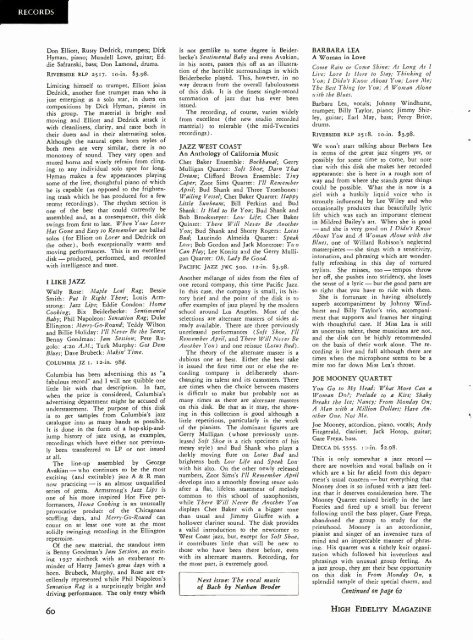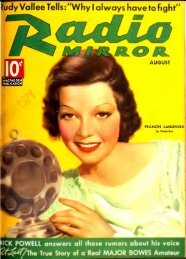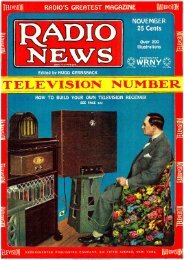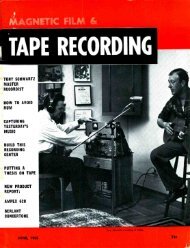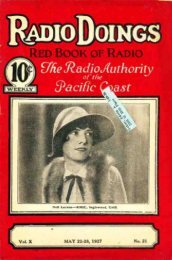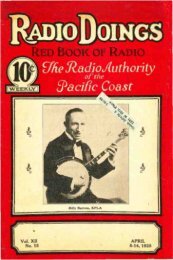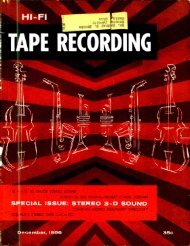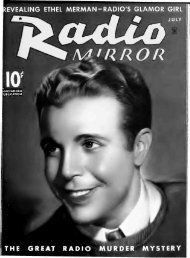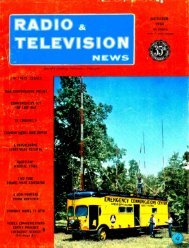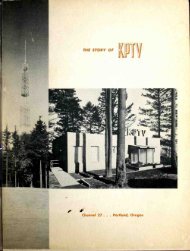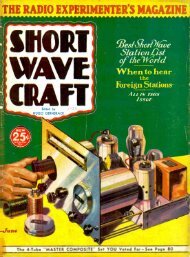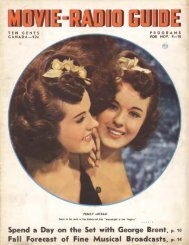Aug - AmericanRadioHistory.Com
Aug - AmericanRadioHistory.Com
Aug - AmericanRadioHistory.Com
You also want an ePaper? Increase the reach of your titles
YUMPU automatically turns print PDFs into web optimized ePapers that Google loves.
RECORDS<br />
Don Elliott, Rusty Dedrick, trumpets; Dick<br />
Hyman, piano; Mundell Lowe, guitar; Eddie<br />
Safranski, bass; Don Lamond, drums.<br />
RIVERSIDE RLP 2517. IO -in. $3.98.<br />
Limiting himself to trumpet, Elliott joins<br />
Dedrick, another fine trumpet man who is<br />
just emerging as a solo star, in duets on<br />
compositions by Dick Hyman, pianist in<br />
this group. The material is bright and<br />
moving and Elliott and Dedrick attack it<br />
with cleanliness, clarity, and taste both in<br />
their duets and in their alternating solos.<br />
Although the natural open horn styles of<br />
both men are very similar, there is no<br />
monotony of sound. They vary open and<br />
muted horns and wisely refrain from clinging<br />
to any individual solo spot for long.<br />
Hyman makes a few appearances playing<br />
some of the live, thoughtful piano of which<br />
he is capable (as opposed to the frightening<br />
trash which he has produced for a few<br />
recent recordings). The rhythm section is<br />
one of the best that could currently be<br />
assembled and, as a consequence, this disk<br />
swings from first to last. When Your Lover<br />
Has Gone and Easy to Remember are ballad<br />
solos (for Elliott on Lover and Dedrick on<br />
the other), both exceptionally warm and<br />
moving performances. This is an excellent<br />
disk - produced, performed, and recorded<br />
with intelligence and taste.<br />
I LIKE JAZZ<br />
Wally Rose: Maple Leaf Rag; Bessie<br />
Smith: Put It Right There; Louis Armstrong:<br />
Jazz Lips; Eddie Condon: Home<br />
Cooking; Big Beiderbecke: Sentimental<br />
Baby; Phil Napoleon: Sensation Rag; Duke<br />
Ellington: Merry -Go- Round; Teddy Wilson<br />
and Billie Holiday: I'll Never Be the Same;<br />
Benny Goodman: Jam Session; Pete Rugolo:<br />
4 :20 A.M.; Turk Murphy: Got Dem<br />
Blues; Dave Brubeck: Makin' Time.<br />
COLUMBIA JZ t. 12 -in. 980.<br />
Columbia has been advertising this as "a<br />
fabulous record" and I will not quibble one<br />
little bit with that description. In fact,<br />
when the price is considered, Columbia's<br />
advertising department might be accused of<br />
understatement. The purpose of this disk<br />
is to get samples from Columbia's jazz<br />
catalogue into as many hands as possible.<br />
It is done in the form of a hop- skip -andjump<br />
history of jazz using, as examples,<br />
recordings which have either not previously<br />
been transferred to LP or not issued<br />
at all.<br />
The line -up assembled by George<br />
Avakian - who continues to be the most<br />
exciting (and excitable) jazz A & R man<br />
now practicing - is an almost unqualified<br />
series of gems. Armstrong's Jazz Lips is<br />
one of his more inspired Hot Five performances,<br />
Home Cooking is an unusually<br />
provocative product of the Chicagoans<br />
scuffling days, and Merry -Go -Round can<br />
count on at least one vote as the most<br />
solidly swinging recording in the Ellington<br />
repertoire.<br />
Of the new material, the standout item<br />
is Benny Goodman's Jain Session, an exciting<br />
1937 aircheck with an exuberant reminder<br />
of Harry James's great days with a<br />
horn. Brubeck, Murphy, and Rose are excellently<br />
represented while Phil Napoleon's<br />
Sensation Rag is a surprisingly bright and<br />
driving performance. The only entry which<br />
6o<br />
is not gemlike to some degree is Beiderbecke's<br />
Sentimental Baby and even Avakian,<br />
in his notes, passes this off as an illustration<br />
of the horrible surroundings in which<br />
Beiderbecke played. This, however, in no<br />
way detracts from the overall fabulousness<br />
of this disk. It is the finest single- record<br />
summation of jazz that has ever been<br />
issued.<br />
The recording, of course, varies widely<br />
from excellent (the new studio recorded<br />
material) to tolerable (the mid -Twenties<br />
recordings).<br />
JAZZ WEST COAST<br />
An Anthology of California Music<br />
Chet Baker Ensemble: Bockhanal; Gerry<br />
Mulligan Quartet: Soft Shoe; Darn That<br />
Dream; Clifford Brown Ensemble: Tiny<br />
Caper; Zoot Sims Quartet: I'll Remember<br />
April; Bud Shank and Three Trombones:<br />
Wailing Vessel; Chet Baker Quartet: Happy<br />
Little Sunbeam; Bill Perkins and Bud<br />
Shank: It Had to Be You; Bud Shank and<br />
Bob Brookmeyer: Low Life; Chet Baker<br />
Quintet: There Will Never Be Another<br />
You; Bud Shank and Shorty Rogers: Lotus<br />
Bud; Laurindo Almeida Quartet: Speak<br />
Lou; Bob Gordon and Jack Montrose: Tuo<br />
Can Play; Lee Konitz and the Gerry Mulligan<br />
Quartet: Oh, Lady Be Good.<br />
PACIFIC JAZZ JWC 500. I2 -in. $3.98.<br />
Another mélange of sides from the files of<br />
one record company, this time Pacific Jazz.<br />
In this case, the company is small, its history<br />
brief and the point of the disk is to<br />
offer examples of jazz played by the modern<br />
school around Los Angeles. Most of the<br />
selections are alternate masters of sides already<br />
available. There are three previously<br />
unreleased performances (Soft Shoe, I'll<br />
Remember April, and There Will Never Be<br />
Another You) and one reissue (Lotus Bud).<br />
The theory of the alternate master is a<br />
dubious one at best. Either the best take<br />
is issued the first time out or else the recording<br />
company is deliberately shortchanging<br />
its talent and its customers. There<br />
are times when the choice between masters<br />
is difficult to make but probably not as<br />
many times as there are alternate masters<br />
on this disk. Be that as it may, the showing<br />
in this collection is good although a<br />
little repetitious, particularly in the work<br />
of the pianists. The dominant figures are<br />
Gerry Mulligan (whose previously unreleased<br />
Soft Shoe is a rich specimen of his<br />
meaty style) and Bud Shank who plays a<br />
darkly moving flute on Lotus Bud and<br />
brightens both Loin Life and Speak Lou,<br />
with his alto. On the other newly released<br />
numbers, Zoot Sims's I'll Remember April<br />
develops into a smoothly flowing tenor solo<br />
after a fiat, lifeless statement of melody<br />
common to this school of saxophonists,<br />
while There Will Never Be Another You<br />
displays Chet Baker with a bigger tone<br />
than usual and Jimmy Giuffre with a<br />
hollower clarinet sound. The disk provides<br />
a valid introduction to the newcomer to<br />
West Coast jazz, but, except for Soft Shoe,<br />
it contributes little that will be new to<br />
those who have been there before, even<br />
with its alternate masters. Recording, for<br />
the most part, is extremely good.<br />
Next issue: The vocal music<br />
of Bach by Nathan Broder<br />
BARBARA LEA<br />
A Woman in Love<br />
<strong>Com</strong>e Rain or <strong>Com</strong>e Shine; As Long As I<br />
Live; Love Is Here to Stay; Thinking of<br />
You; I Didn't Know About You; Love Me;<br />
The Best Thing for You; A Woman Alone<br />
with the Blues.<br />
Barbara Lea, vocals; Johnny Windhurst,<br />
trumpet; Billy Taylor, piano; Jimmy Shirley,<br />
guitar; Earl May, bass; Percy Brice,<br />
drums.<br />
RIVERSIDE RLP 2518. to -in. $3.98.<br />
We won't start talking about Barbara Lea<br />
in terms of the great jazz singers yet, or<br />
possibly for some time to come, but note<br />
that with this disk she makes her recorded<br />
appearance: she is here in a rough sort of<br />
way and from where she stands great things<br />
could be possible. What she is now is a<br />
girl with a huskily liquid voice who is<br />
strongly influenced by Lee Wiley and who<br />
occasionally produces that beautifully lyric<br />
lift which was such an important element<br />
in Mildred Bailey's art. When she is good<br />
- and she is very good on I Didn't Knott'<br />
About You and A Woman Alone with the<br />
Blues, one of Willard Robison's neglected<br />
masterpieces -she sings with a sensitivity,<br />
intonation, and phrasing which are wonder-<br />
fully refreshing in this day of tortured<br />
stylists. She misses, too - tempos throw<br />
her off, she pushes into stridency, she loses<br />
the sense of a lyric - but the good parts are<br />
so right that you have to ride with them.<br />
She is fortunate in having absolutely<br />
superb accompaniment by Johnny Wind -<br />
hurst and Billy Taylor's trio, accompaniment<br />
that supports and frames her singing<br />
with thoughtful care. If Miss Lea is still<br />
an uncertain talent, these musicians are not,<br />
and the disk can be highly recommended<br />
on the basis of their work alone. The recording<br />
is live and full although there are<br />
times when the microphone seems to be a<br />
mite too far down Miss Leas throat.<br />
JOE MOONEY QUARTET<br />
You Go to My Head: What More Can a<br />
Woman Do ?; Prelude to a Kiss; Shaky<br />
Breaks the Ice; Nancy; From Monday On;<br />
A Man with a Million Dollars; Have Another<br />
One. Not Me.<br />
Joe Mooney, accordion, piano, vocals; Andy<br />
Fitzgerald, clarinet; Jack Hotop, guitar;<br />
Gate Frega, bass.<br />
DECCA DL 5555. I'D-in. $2.98.<br />
This is only somewhat a jazz record -<br />
there are novelties and vocal ballads on it<br />
which are a bit far afield from this department's<br />
usual concern - but everything that<br />
Mooney does is so infused with a jazz feeling<br />
that it deserves consideration here. The<br />
Mooney Quartet existed briefly in the late<br />
Forties and fired up a small but fervent<br />
following until the bass player, Gate Frega,<br />
abandoned the group to study for the<br />
priesthood. Mooney is an accordionist,<br />
pianist and singer of an inventive turn of<br />
mind and an impeccable manner of phrasing.<br />
His quartet was a tightly knit organization<br />
which followed his inventions and<br />
phrasings with unusual group feeling. As<br />
a jazz group, they get their best opportunity<br />
on this disk in From Monday On, a<br />
splendid sample of their special charm, and<br />
Continued on page 62<br />
HIGH FIDELITY MAGAZINE


